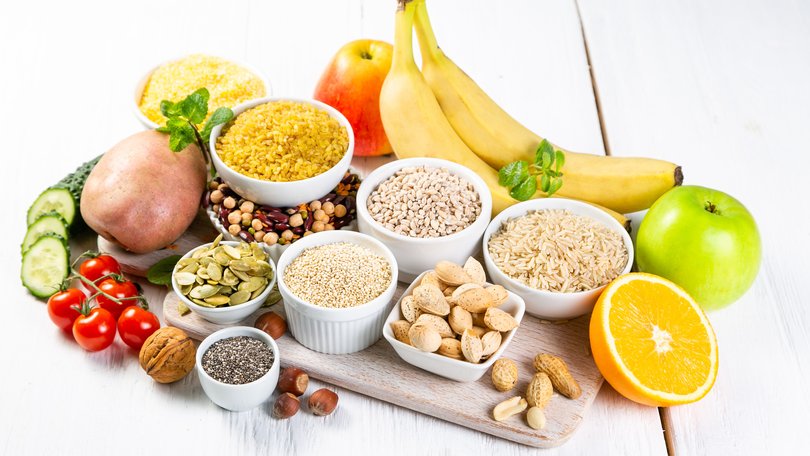Nutritionist Sarah Di Lorenzo: We’re missing out on fibre but boosting it is easier than you think
Nutritionist Sarah Di Lorenzo: The vast majority of Australians are not getting enough fibre in their diet. Here’s how to fix it.

Did you know the vast majority of Australians are not getting enough fibre in their diet? Statistics show that 28 per cent of adults and 42 per cent of children are meeting their recommended daily intake of dietary fibre. Less than 20 per cent are consuming the amount of fibre to reduce chronic disease risk. ore than 95 per cent of adults and 99 per cent of children do not meet the recommended daily intake for legumes and vegetables which are our main sources of dietary fibre.
Fibre is a critical nutrient in a healthy diet supporting digestive health, gut health, heart health, chronic disease prevention and overall wellbeing. There is a multitude of evidence indicating that most people will benefit from eating more fibre-rich foods, and while supplements like psyllium husks can play a role for some, the emphasis should be on whole foods as the primary source.
But first to understand fibre a little more. Soluble fibre dissolves in water and forms a gel-like substance. Soluble fibre lowers cholesterol, regulates blood glucose by slowing down absorption of sugar and can support heart health and diabetes management. It also helps lower LDL cholesterol and can control appetite. Soluble fibre includes oats, peas, beans, lentils, apples, avocado, carrot, banana, psyllium husk and citrus.
Sign up to The Nightly's newsletters.
Get the first look at the digital newspaper, curated daily stories and breaking headlines delivered to your inbox.
By continuing you agree to our Terms and Privacy Policy.Whereas insoluble fibre does not dissolve in water, rather is a bulking agent to the stool-supporting movement through the digestive system, which important for lowering the risk of bowel cancer. Food sources include wheat bran, whole grain breads, cereals, brown rice, seeds, nuts, fruit and vegetables.
Our recommended daily intake is 38 grams for men and 28 garms for women for disease prevention.
The richest sources of fibre are plant-based whole foods, that can provide both soluble and insoluble fibre, along with vitamins, minerals and phytochemicals. These include legumes such as beans, lentils, chickpeas, split peas, and soybeans. Around ½ a cup of these provides 8 grams of fibre.
Vegetables including artichoke, brussels sprouts, sweet potato, beetroot, broccoli, carrots, and leafy vegetables are excellent sources of fibre. Root vegetables including sweet potatoes, carrots and beetroot are filling, delicious, versatile and rich in fibre. Fruits including apples, pears, raspberries, oranges, kiwi fruit and bananas are excellent and always leave the skins on, well except for the banana. Skins are excellent and full of fibre.
Whole grains including oats, brown rice, barley, quinoa, whole wheat, rye and products like whole grain breads, wraps, rice cakes and whole grain pasta are excellent as well.
Nuts and seeds should be consumed daily and are perfect to garnish meals or as a snack. Stock up on chia seeds, flaxseed, almonds and sunflower seeds, the other bonus is you are getting your good fats, plant-based protein, magnesium, vitamin E as well as fibre.
When it comes to Psyllium husk not everyone needs to add it to their diet but it can really help. Psyllium is a soluble, gel-forming fibre extracted from the Plantago ovata plant and supports bowel regularity, cholesterol, blood sugar control and it is safe to use for motility or as a laxative. If you have a healthy fibre rich diet you don’t need to consume it.
Getting your fibre from foods is linked with lower rates of heart disease, diabetes, colon cancer and good gut health. This is also because whole real foods include a range of fibre types and bring with them beneficial nutrients and phytochemicals that supplements cannot match. Psyllium supplementation can be helpful for people with specific needs like chronic constipation, high cholesterol or difficulty meeting fibre targets due to dietary restrictions, being a picky eater or other health conditions.
The goal is to have a diet rich in fruit, vegetables, legumes, whole grains, nuts and seeds. You can consider adding some psyllium husk to baked goods, oats or smoothies and even just adding a teaspoon to a glass of water if you feel you are not meeting your recommended intake of fibre.
If you are wanting to embrace more fibre for overall good health my advice is slow and steady to start to avoid bloating or discomfort. Build your fibre intake up slowly for your body to adjust along the way. Keep up your fluids and remember how amazing fibre is for our bodies for long term health, longevity and wellness.

